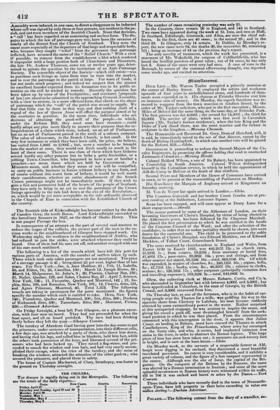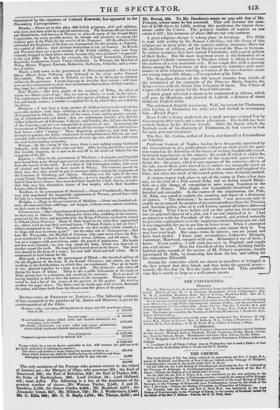POLAND. — The following extract from the diary of a traveller, fin.
thenticated by the signature of Colonel Krsewski, has appeared in the Nuremberg Correspondent—.
Wiatka.—There are in this Ones: 360 Polish prisoners, civil and military, who have just been tried by a special commission. The Russian officers Grewer
and Bezobrazow, well known in Warsaw as aides-de-camp of the Grand Duke Constantine, try every.possible means, by threats and promises, to engage the military part of the Poles for the service of the Emperor. All the officers of the celebrated 4th Regiment of the Line. are transported, for the present, to Tobolsk,
the capital of Siberia: their ultimate destination is not vet known. In Kursk and Woroncz there are a great number of the Polish nobility, who have been violently dragged to these places merely because they were declared "suspected" in the year 1826. In Kursk, for example, the Colonel Tarnowski, Captains Karwizki, Lenkiewicz, Count Victor Ossolinski. In Worancz, the Marshal of Wilma, Messrs. Wagner, Zawisza, Bisliewicz, Butharyn, Oskierko, and a num- ber of others.
Wasil, a little town in the government of Nishneinovogorod.—Here I met fifteen officers from Volhynia, who belonged to the corps under General Dwernitzki. They are sent to Tobolsk ou foot, to be there put as common soldiers in the garrisons. I want language to describe their misery ; still their tears are less consecrated to their own misfortunes than to those of their country : they hope for a divine retribution. Near Tarhin.—Met forty pupils of the academy of Wilna, the oldest of whom was fifteen years of age : they are sent to Siberia to work in the mines. The unfortunate, who are condemned to this species of labour, lose their Chris- tian and family names ; a number is supplied fur it, by which they are called by the driver.
.Drakzow.—I met here a large number of children between ten and twelve years old, mothers with their sucklings in their arms, and old men. They arc all transported to Siberia. Farther on the route, I met similar groups, consist- ing of a hundred souls and above : they are unfortunate families who fled for shelter in the forests of Lithuania, Volhynia, and Podolia; they fell into the hands of the Cossacks, and are now transported as prisoners of war. In entering the Government of Mohilew there are found on all the stations fortified and harries- doed houses called " ostrog,i." These disgusting. pestiferous, and dark huts, dettimal as quarters for felons condemned to transportation to Siberia, are now crowded with victims of the insurrection, of every age, sex, and rank, and excite the most heart-rending sympathy. Kulaya.—In the ustrog of this town there is now sighing young Gotthard Sobanski, with chains on his arms and feet. After having passed five years in this horrible dungeon, he is now to be sent off to the mines of Siberia for the remainder of his life.
Lipnow, a village in the government of Wladimir.—A singular and frightful noise heard from a rue distant spot excited our attention ;—it seemed as if it came from the bowels of the earth. It was that of MO Lithuanian nobles, who were all chained and barefoot on their march to Siberia. The sentence passed on them was, that they should be put as common soldiers among the regiments of the Caucasus, of Orenburg, and Siberia. Shocking was the sight of the two young Counts Tyszkiewicz, almost children ; at every step they sunk under the load of their heavy chains; they stretched their hands for a little charity. in order that they may buy themselves chains of less weight, which their heartless keepers refused them. Similiew, in the government of Smolensk.—General Prondzynski, the same man who negotiated the lamentable capitulation of Warsaw, passed here with his lady in a convenient travelling chariot. Krupka, a village in the government of Mohilew.—About one hundred sol- diers, all emaciated village milli:rings and fatigue, without arms, and on crutches, on their route to Siberia.
Choracewicze.—Met a detachment of between fifty and sixty soldiers in chains, on their way to Siberia. They belonged to those who, confiding in the amnesty promised by the Czar, and guaranteed by the King of Prussia, resolved to return to Poland (from Prussia). Many of them began to cry when they approached us; others tried to sing their national hymn, "Poland, Poland, is not yet lost !" Others exclaimed to us, " Return, return to our dear mother (their country); we hope still once to return again !" On the other side of Churacewicze—Met here Mr. Warcynski, the Marshal of Osmiima (the same town where the Kir- gises murdered in a church four hundred wives, children, and old men). He was on a waggon with post-horses, under the guard of gendarmes. His hands and feet were chained ; an iron ring round the body, which was fastened to another round the neck. His long beard flowed down to his breast. The head was shaved in the form of a cross ; his coat half black and half white. He is condemned to hard labour for life.
Bobraysk, a fortress-in the government of Minsk.—Six hundred soldiers of the 4th Regiment of the Line, of the Kuszel Chasseurs, and others, are here working on the fortifications, to which they are condemned. They go in bands of • ten, Chained together by a long iron pole. The chains are only taken off during the hours of labour. There is also a noble Lithuanian of the name of Zaba, pining here in a dungeon, and awaiting his sentence. He is accused of harinrsb intended to deliver over the fortress to the insurgents. When he was ar- restedhe had a list of the names of the patriots in his pocket. He tried to swallow the paper down. The Shirri tore his teeth open with an iron, lacerated the palate, and drew forth from his throat some few pieces of the paper.




























 Previous page
Previous page